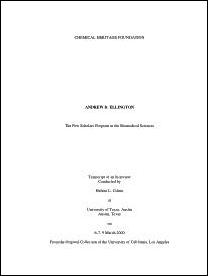Oral history interview with Martin D. Snider
- 1990-Mar-08
Martin Snider grew up mostly on the south side of Chicago, Illinois, later moving to Milwaukee, Wisconsin, and then to Newton, Massachusetts. His father was an academic physician, and Snider and his two siblings all ended up in academics too. A National Science Foundation summer program at Brown University convinced him to matriculate there.
At Brown, Snider worked with Joseph Steim, a biophysical chemist interested in the functionality of membranes. Snider feels that Brown, with its emphasis on undergraduates, gave him an excellent education. Encouraged by Joan Lusk, Snider entered Eugene Kennedy’s lab at Harvard University. Working with membrane proteins, as well as Kennedy, was difficult but he became Snider’s most important influence. Because his wife was at Harvard Medical School, Snider chose to do postdoctoral work at MIT. There he began his research into glycoprotein synthesis in the lab of Phillips Robbins. Snider was glad to leave the high-stress competition to accept a staff associate position at Carnegie Institution for Science, which he says was the nicest place he has ever worked. Funding and lack of distractions allowed Snider to concentrate on new research into vesicular traffic, and he was very productive.
When it was time for Snider and his wife, who is a neuropharmacologist, to establish their own labs, they found job-hunting to be most productive in medical schools in small cities. Ultimately they settled on Case Western Reserve University for both of them. Snider has continued his vesicular traffic work, but he has also returned to glycoprotein synthesis, where he says he has new tools to address old problems. He talks about his colleagues with similar interests; the size and composition of his lab; oral tradition in labs; and his own distinctive lab management. He has the additional responsibilities of grant-writing, reviewing papers, and teaching, leaving him perhaps half time in his lab.
Access this interview
By request 1 PDF Transcript File and 4 Audio Recording Files
Fill out a brief form and a staff member will review your request for these files. You should receive an email within 3 business days.
Usage is subject to restrictions set by the interviewee.
If you have any questions about transcripts, recordings, or usage permissions, contact the Center for Oral History at oralhistory@sciencehistory.org.





